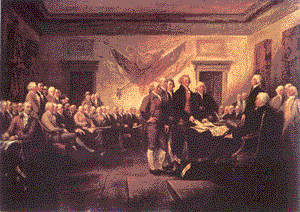Natural rights are the fundamental political concept, and are derived from the proper ethical basis (enlightened self-interest). Since man’s prime value is his own life, the prime right is the right of life, and by extension self-ownership. Only by protecting life can a society ensure the free exercise and flourishing of the lives of its own citizens.
All rights are derived from the right of life. With the possession of one’s body comes the right of one’s actions. One can hardly be said to own his life if he is not free to act as he sees fit. The same thing applies to the result of these actions, which is property. All individual rights can be subsumed to the rights of self-ownership, action and property.

Natural rights are natural because they are derived from objective deductions and observations, and therefore give us an optimal pattern of government to follow. In practice, this means that a government’s functions should be limited to protecting the natural rights of its citizens, instead of using them for its own benefit. Such a government would be completely libertarian.
An objection to the notion of natural rights is that they are not materially obvious – for example, governments break them regularily. How could they exist ? But rights are not material entities. They are indications of the pattern of laws which is optimal for a human society. The same thing could be said of a standard. Even if some manufacturers don’t follow a given standard, this does not make that standard any less desirable.